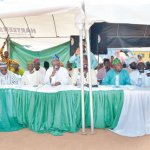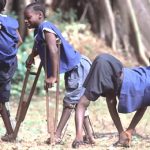How much direction and discernment it requires to be the wife of a great man!
– Louisa Adams (wife of John Quincy Adams)
Throughout the crisis, my wife, who is a heroine in her own right ….
– Obafemi Awolowo (my March Through Prison, 1985:244)
– ….What but Thy grace can foil the tempter’s power?
Who, like Thyself, my guide and stay can be?
– “Abide with Me” – Henry Francis Lyte (1847)
–
“BABA SEGUN, OKUNRIN ONIJOGBON YEN tun ti de o” (“Segun’s dad, that troublesome man is here again”)
Hannah Awolowo quietly announced to her husband in Remo dialect around eight in the morning on November 2, 1962. He was shaving at a wash-basin just by the side of the door to his bedroom. He still had shaving foam on his chin.
“Lynn?”
“Yes, Lynn.”
Hannah went down the stairs to fetch Lynn after her husband asked her to lead him upstairs. He was accompanied by one Ezekwem, also a police officer.
At this point in 1962, some British officers remained in the police force. They and their Nigerian colleagues were all in the service of Her Majesty’s Government, because Nigeria was yet to become a Republic . Most of these British police officers and the other British officers in the civil service who were holdovers from the colonial era saw themselves as agents of the imperial order charged with ensuring the perpetuation of British interests in Nigeria. Awolowo was generally regarded by these officers as a major stumbling block to the continuation of British suzerainty in Nigeria at the end of colonial rule. He had opposed the Anglo-Nigerian Defence Pact, even though he was one of the leaders who were made to sign the Pact during the 1957-58 Constitutional Conference in London “under duress” – that is, as the condition under which Independence would be granted in 1960. The details of the pact were such that no serious sovereign country ought to agree to it, because it would have undermined Nigeria’s sovereignty. Most Nigerians and civil society groups, including the press, student unions, trade unions, youth movements, and many politicians shared Awolowo’s opposition to the pact. Once independence was granted, the Abubakar Tafawa Balewa-led federal government was forced in January 1962 to abort the pact. However, this was listed among Awolowo’s many “crimes” against the British.
Few holdovers of the colonial era had greater loathing of Awolowo than Lynn. He was therefore an enthusiastic tool in the hands of those Awolowo accused of having committed themselves to “nothing but the death of the Action Group and the political liquidation of Action Group leaders”.
This morning, the insolent operative of the ascendant order in immediate postcolonial Nigeria, John Lynn, carried a malicious smirk on his face that even his nervous smile could not conceal.
“What bad news have you for me this morning?” The former Premier of Western Region and Leader of Opposition asked Lynn to make light of the national tragedy that was unfolding in Nigeria.
“”I have never brought you bad news!” Lynn shot back resentfully. Brazen lair, Hannah Awolowo must have thought as she listened to the conversation! She had not labeled him “okunrin oni wahala” for nothing. He had been harassing the couple and their family incessantly for many months now.
In fact, Lynn had brought bad news.
As Awolowo ushered him and Ezekwem into his office, the latter laid his hand on the Leader of Opposition’s left shoulder and said “In the name of Her Majesty, the Queen, I hereby arrest you, on a charge of treasonable felony, conspiracy to commit a felony, and conspiracy to effect an unlawful purpose. You are not obliged to say anything, but whatever you say will be taken down and may be given in evidence at the trial.”
This was the good news the cowardly Lynn brought!
As he prepared to follow the policemen to the High Court at Tafawa Balewa Square, Awolowo reflected on the “Catalogue of… acts of humiliation …. Directed against” him since May 1962…
Hannah too was reviewing the events of the last few months in her mind since the declaration of a state of emergency in the Western Region on May 29, 1962 when her husband was restricted within three-mile radius of their house in Ikenne. Upon hearing the bad news of the restriction, they both drove to Ibadan to pack a few things before heading to Ikenne on May 31. Twenty days later, he was restricted to Lekki – as described in the Preface.
After thirteen days in Lekki, he was ordered to return to Ikenne where he was again restricted to a one-and-half radius of his house. He returned to Ikenne on July 2 with his wife, only to be ordered eighteen days later to move back to his official residence at 7, Bell Avenue, Ikoyi, Lagos. He arrived Bell Avenue on July 22 and was restricted to one-and-a-half mile radius of the house. This restriction was changed to house arrest on September 22. Only Hannah, their children and his cook and steward were allowed to have access to him. He was no longer allowed the use of his or any private car. A police car took him to the Coker Commission of Inquiry (Into The Affairs of Certain Statutory Corporations in Western Nigeria) where he appeared regularly.
The Commission, headed by Mr. Justice George Baptist Ayodola was set-up to investigate the activities of the corporations between 1954 and 1962. The other two members of the Commission were Akintola Williams and James Olajide Kassim. The three, Awolowo later commented, were “carefully and purposively chosen” because they were all sympathizers of the NCNC. The Commission itself was dismissed by Awolowo as “a quasi-judicial machine deliberately constructed by the powers-that-be for the oppression, persecution, and total destruction of a political rival.”
It turned out to be the first step into the ploy to destroy Awolowo politically and, if possible, physically liquidate him. Through it all, Hannah followed her husband and stayed with him in restriction and house arrest.
“Why are they doing all these things to us,” Hannah asked her husband as he prepared to leave with those who had to arrest him.
TO BE CONTINUED
EBINO TOPSY – 0805-500-1735 (SMS ONLY PLEASE)






